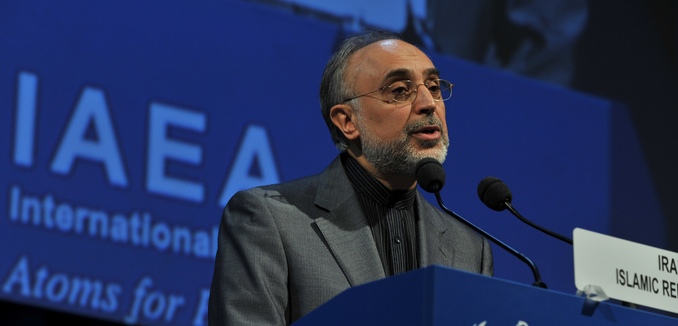The United States began talks with Iran in 2011, two years before previously reported and while Mahmoud Ahmadinejad was still president of the Islamic Republic, an analysis published Wednesday by the Middle East Media Research Institute (MEMRI) revealed. The analysis was based on statements made by top Iranian officials to domestic media in recent years.
According to the MEMRI report, secret contacts between the two countries began in 2011. There were three rounds of meetings between American and Iranian officials between then and March 2013, just prior to the election of Hassan Rouhani. Iran demanded a number of concessions up front to begin the talks, and the Obama administration acceded to all of them.
According to a speech given by Iranian Supreme Leader Ayatollah Ali Khamenei this past June, the United States accepted Iran as a “nuclear power” in order to get the negotiations started.
Khamenei told about the American initiative, saying that it had begun during the Ahmadinejad presidency and had centered on U.S. recognition of a nuclear Iran: “The issue of negotiating with the Americans is connected to the term of the previous [Ahmadinejad] government, and to the dispatching of a mediator to Tehran to request talks. At that time, a dignified individual from the region [referring to Omani Sultan Qaboos] came to visit me as a mediator, and said explicitly that the American president [Obama] had asked him to come to Tehran and present the Americans’ request for negotiations. The Americans told this mediator: ‘We want to solve the nuclear issue and lift sanctions within six months, while recognizing Iran as a nuclear power.’ I told this mediator that I did not trust the Americans or their words, but I agreed, when he persisted, to reexamine this issue, and the negotiations began.
Ali Akbar Salehi, the current head of the Atomic Energy Organization of Iran, claimed in a TV interview this April that during the second round of negotiations, the United States agreed to Iran’s “right” to enrich uranium to keep the talks going.
History will judge the correspondence between us, and the defective morality [on the American side] in the process, for which there is documentation. In the Ahmadinejad government, I gave an interview in which I stated, after I had received permission [to do so], that we will soon witness good events. I thought we could move ahead in these talks easily, and I did not know that we would hit a roadblock. Happily, in the second round of talks, the Sultan of Oman wrote to Ahmadinejad: ‘The American and Iranian representatives came to me and the representatives of America said that they officially recognize [Iran’s right to] enrichment.’ This was the first step, that opened the door to the negotiations.
MEMRI prepared another report last month based on a Salehi interview in which he was more explicit about Iran’s demands during negotiations.
It was a man named [Salem bin Nasser Al-]Ismaily, who at the time was an advisor for the Omani ruler and who still works for the Omani Foreign Ministry. He had good relations with the Americans and was trusted by Omani officials. I told Suri: ‘I am not sure how serious the Americans are, but I will give you a note. Tell them that these are our demands. Deliver it on your next visit to Oman.’ I wrote down four clear issues, one of which was official recognition of rights to [uranium] enrichment. I figured that if the Americans were sincere in their offer, then they must agree to these four demands. Mr. Suri gave this short letter to the mediator, and stressed that these were Iran’s demands. [He added that]if the Americans wished to solve this issue, they were welcome to, otherwise dealing with White House proposals would be useless and unwarranted…
All the demands in the letter were related to the nuclear challenge. These were issues we have always come against, such as closing the nuclear dossier [in the Security Council], official recognition of [Iran’s] right to enrich [uranium], and resolving the issue of Iran’s actions under the PMD [Possible Military Dimensions]. After receiving the letter, the Americans said: ‘We are certainly willing and able to easily solve the issues Iran has brought up.’
The three conditions have been resolved according to Iran’s terms.
The first four of the United Nations Security Council resolutions targeting Iran for its illicit nuclear program were passed under Chapter 7 of the UN Charter, which authorize action against countries that are deemed to be threats to peace. After the nuclear deal was signed, Rouhani hailed the agreement for removing Iran from being a Chapter 7 country.
The details of the possible military dimensions of Iran’s past illicit nuclear work are governed by a secret agreement between Iran and the International Atomic Energy Agency.
Though the United States agreed to accept Iran’s right to enrich, there is no such right written in the Nuclear Nonproliferation Treaty, the 1970 international agreement to which Iran and the United States are parties. While the treaty acknowledges an “inalienable right of all the Parties to the Treaty to develop research, production and use of nuclear energy for peaceful purposes,” there is no right to enrich uranium written explicitly into the treaty.
Former Israeli national security adviser Gen. Yaacov Amidror wrote last month that when the United States changed its priorities from dismantling Iran’s nuclear program to delaying it, the Obama administration stopped including Israel in its consultations over Iran.
[Photo: IAEA Imagebank / Flickr ]




